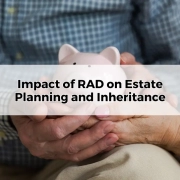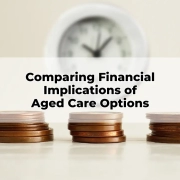How to Incorporate Aged Care Costs into Your Estate Plan
Table of Contents
ToggleEstate planning is a crucial process that ensures your assets are distributed according to your wishes. As we age, it’s essential to consider not only the legacy we leave behind but also the costs associated with aged care. Incorporating these expenses into your estate plan can provide peace of mind and financial security for you and your loved ones.
Understanding Estate Planning
Estate planning involves the organisation and management of your assets to ensure their effective distribution after your death. It encompasses wills, trusts, powers of attorney, and other legal documents that articulate your wishes. The primary purpose of estate planning is to preserve your wealth, minimise taxes, and ensure a smooth transition of your assets.
Anticipating Aged Care Needs
Anticipating your future care requirements is a fundamental step in effective estate planning. This involves assessing potential health issues, considering longevity, and understanding the level of care you might need. Early assessment allows for better preparation and incorporation of these costs into your estate plan.
Calculating Potential Aged Care Costs
Aged care costs vary widely depending on the type and level of services required. These can range from in-home care to full-time residential facilities. Estimating long-term expenses involves researching current costs, factoring in inflation, and considering personal health conditions. This proactive approach ensures that your estate plan can adequately cover these expenses.
Incorporating Aged Care Costs into Your Estate Plan
Incorporating aged care costs into your estate plan requires strategic planning. This includes allocating sufficient funds to cover future care while balancing other financial goals, such as providing for beneficiaries. Developing a comprehensive plan ensures that you can maintain your quality of life without compromising your legacy.
Utilising Trusts for Aged Care Funding
Trusts offer a robust mechanism for funding aged care. They can protect your assets, provide income for care expenses, and offer tax benefits. Different types of trusts, such as revocable and irrevocable trusts, serve various purposes and should be chosen based on your specific needs and objectives.
Insurance and Aged Care
Long-term care insurance plays a pivotal role in covering aged care costs. Evaluating different insurance options and understanding their benefits and limitations can provide a financial safety net. This insurance can cover various services, reducing the burden on your estate.
Superannuation and Retirement Savings
Leveraging superannuation and retirement savings is vital in funding aged care. Proper management of these funds ensures they last throughout your retirement and cover any unforeseen care costs. Strategic withdrawals and investment choices within your superannuation can optimise your financial security.
Investment Strategies
Diversifying your investments is a prudent approach to ensure sufficient funds for aged care. Allocating assets in a way that balances risk and return, while considering liquidity needs, can provide the necessary resources when care expenses arise. This strategy helps in maintaining a steady income stream for care costs.
Legal Considerations
Legal instruments like powers of attorney and advance care directives are essential in estate planning. They ensure that your healthcare and financial decisions are made according to your wishes if you become incapacitated. Establishing guardianship arrangements can also provide additional security.
Communicating Your Plan
Open communication with family members about your estate plan and aged care preferences is crucial. This ensures that everyone understands your wishes and reduces the potential for conflicts. Clear communication fosters a supportive environment and ensures that your plan is executed smoothly.
Reviewing and Updating Your Estate Plan
Regular reviews of your estate plan are necessary to adapt to changes in personal circumstances, financial status, and legal requirements. Updating your plan ensures it remains relevant and effective in meeting your needs and goals. This ongoing process helps in maintaining the integrity of your estate plan.
Conclusion
Incorporating aged care costs into your estate plan requires thoughtful consideration and strategic planning. By understanding potential expenses, utilising financial tools, and maintaining open communication, you can create a robust plan that ensures both your care and your legacy are well-protected. This comprehensive approach provides peace of mind and financial security for you and your loved ones. Get in contact with Aged Care Financial Advisers to learn more about making smart financial decisions in aged care on 1300 550 940.








